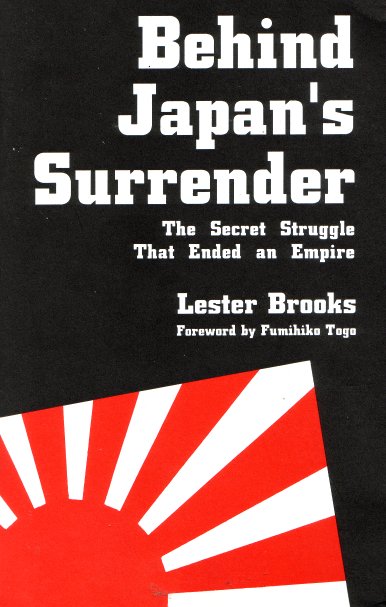
Behind Japan's Surrender

As with the other books, I will only point out some of the most interesting pieces of this very detailed book. My own comments on the contents will be in ( ).
The author has an excellent summary of what was going on in Japan at the time:
”The city itself was the heart of a country under siege. More efficiently and intensely than in any other siege in history, the enemy was grinding down the people and every material thing Japanese. Ringed by a blockade of hundreds of surface warships and under-water craft, sealed off by mines and vigilant enemy aircraft, pounded, burned, and ripped by the bombers and guns of the Allies, the Japanese people were rapidly advancing backward. From the most modern industrial nation in Asia Japan was being transformed into a helpless, fragmented society one stage away from the Stone Age.”
The Japanese government had hoped that the Soviets could serve as an avenue of communications to the US and that they would help in the peace process, and in doing that would remain neutral.
Something which I found particularly interesting:
”When the Russian Revolution occurred in 1917, the Japanese were 'invited' by the British and Americans to send troops into Siberia to 'maintain the status quo.' The request was for 7000 troops from each Allied power for this expedition. The Japanese enthusiastically cooperated-so much so that they lost count until ten times 7000 had been dispatched. And then they lost track of the time.”
In WWI Japan was an ally of the US. Thus, this gave the Japanese an open invitation to put troops into another country's territory. The Japanese troops were eventually withdrawn, though.
Vice-Admiral Takajiro Oniishi was the one who came up with the kamikaze idea as an actual program. He also didn't want to make peace, and thought the kamikaze groups could bring Japan victory.
During one Imperial Conference before the end of the war objects to the Potsdam declaration were given, these including that the Japanese wanted a guarantee that the imperial family would continue to reign, Japan would take care of her own disarmament, Japan would try any war criminals, and the occupation of Japan would be with a minimum number of troops and in a minimum number of places.
Apparently, they had forgotten that the loser does not dictate the terms of the surrender.
The book holds that Japan was a beaten nation after the middle of 1944. Navy leaders pretty much knew after Midway; Army leaders knew after Guadalcanal fell in January of 1943. Many Government leaders knew when Leyte fell in late 1944.
(Which brings up the question of why, if so many of the military and government leaders basically knew the war was lost, didn't they try to end the war much earlier? Well, for one thing, Japan had never been beaten in a war and admitting that they were going to be beaten was incredibly hard. They thought the Japanese spirit was undefeatable, but they refused to recognize that, no matter how strong the spirit of a people, if the other side controls the land, the sea, and the air theaters of war then there's not much else your country can do. Some of the militarists were fantatics, just as fanatical as the terrorists that we see in our present day and age, and reality doesn't always manage to find a way to seep into their minds.)
The book points out that some of the leaders even refused to believe that the bomb dropped on Hiroshima was atomic. (They probably didn't want to admit that the enemy had a weapon so far ahead of anything the Japanese had, and that the enemy could use the weapon virtually at will.)
The book also talks about the coup attempt by the militarists who really wanted to keep the war going. It also notes rumors about the Chinese landing in Japan, or about an American landing where the troops were raping and pillaging at will. Even after the surrender the situation was not normal. Over a thousand men in the military committed suicide.
One thing to note; the book was quite detailed. This summary is only a very small portion of what is in the book.
Main Index
Japan main page
Japanese-American Internment Camps index page
Japan and World War II index page
|